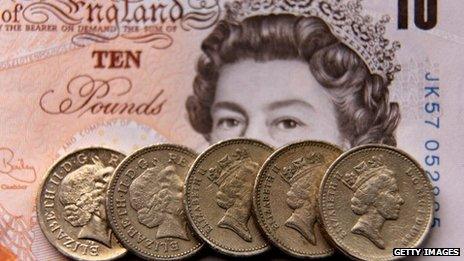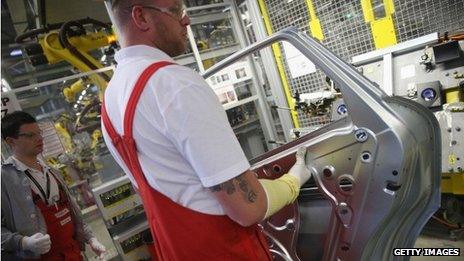When will the UK pay its way in the world?
- Published
- comments

The unexpectedly slow growth in the eurozone is bad news all round - unless you happen to be long of US and German government bonds, whose prices have risen (as they tend to do, as putative bomb-proof investments, when the economic news is gloomy).
And it makes more resonant a new analysis by the Bank of England of the UK's poor trade and dire current account deficit - for reasons that (I hope) will become clear in a moment or two.
Just to remind you, the current account shows the difference between money paid to the rest of the world by UK residents and money received from the rest of the world, stemming from trade, income generated by assets and various other transfers.
It is a measure of whether Britain is paying its way in the world, or whether it is having to borrow from abroad and sell assets to finance our way of life.
Now what was a little worrying was that the deficit on the current account reached 5.6% of GDP, or economic output, in the third quarter of 2013 and fell to just a little bit lower, 5.4%, in the fourth quarter.
That 5.6% was - ahem - something of a milestone: it was the biggest quarterly deficit since records began in 1955.
And it explains why the record aggregate indebtedness of the UK has been falling so slowly, and is still not much below 500% of GDP on the Mckinsey measure (though see my previous blog).
Hideous deficits
The point is that we've typically been borrowing from the rest of the world to finance these current account deficits, rather than selling assets and investments.
So in absolute terms it has been impossible for UK debts to fall.
However UK debts have been falling as a proportion of GDP because nominal output has risen faster than debts - so in that sense, the UK's debt burden has reduced a bit.
So why the hideous current account deficits?
Well part of the explanation has been our persistent inability to sell more goods and services to the rest of the world than we buy from the rest of the world: there has been a persistent trade deficit since the late 1990s, and that deficit was equivalent to 1.5% of nominal GDP last year.
As it happens, there has been a mixed underlying performance in trade. Since the Crash of 2008, our exports of financial services, traditionally a UK strength, have been hurt. But the deficit in goods has narrowed, thanks in large part to a weakening of sterling (which has, of course, been partly reversed over the past year).

The latest eurozone growth figures show only Germany expanded strongly
Here is a nice thing: a survey published this morning by the British Chambers of Commerce of more than 2600 British exporters showed 71% of them expect their sales to increase in the current quarter, which is the second most optimistic they've ever been.
But as you've doubtless deduced, the big contributor to the lamentable current account performance was not our still limp trading performance - since it has been limp for years and years.
What has gone wrong is that the UK has been earning much less from businesses we own abroad, other investments we hold abroad, and our holdings of foreigners' debts.
Here is where we get back to how that poor economic performance in the eurozone relates to our disappointing current account: almost half of the UK's foreign direct investments are in the euro area, where growth, apart from in robust Germany, is almost non existent.
'Wodges of debt'
Even in the first three months of this year, when much of the world was enjoying a reasonable recovery, France's economy stagnated and Italy's shrunk.
What is more, UK residents almost certainly hold wodges of supposedly safe debts - such as German and US bonds (them again) - whose yields became de minimis with all that money creation by central banks that was intended to prevent recession becoming depression.
Anyway the good news is that the Bank of England believes that the UK's net investment income will improve a bit over the coming years, but that it will remain "weaker than its average over the past decade".
That means we are probably in for a prolonged period of current account deficits being rather higher than they have been since the last time we generated a surplus (which, just so that I can spoil your morning, was as long ago as 1983).
Or to put it another way, we will either have to continue to borrow large sums from the rest of the world, or we will have to sell some of our overseas assets.
One rather important question, posed by the Bank of England, is why the rest of the world should continue to lend to us, given that we have been a consistent borrower for more than 30 years.
Surely at some point our creditors might begin to question whether we are good for our debts.
That said, they would not worry about our ability to repay if the value of our assets exceeds our total liabilities, if we have a positive net international investment position, or NIIP.
So what is the value of the NIIP?
Well it tends to swing around a good deal, but right now it is just about in balance, according to the official data, having been negative in 2012.
Impossible British dream?
So the direction of travel is benign.
Even so, on the face of it we don't have a surplus of crown jewels to pawn or flog in extremis.
Except that the Bank of England believes the official position understates the true position, because assets are included at cost rather than market value.
It has attempted a revaluation at current prices and believes that the NIIP at market values is positive to the tune of just under 30% of GDP.
If the Bank of England is right, our creditors can take comfort that we have the wherewithal to pay them back.
But there is of course another way of seeing the positive NIIP value of 30% of GDP.
If the new norm for current account deficits were to settle at 3% or 4% of GDP, we would only have a few years before that surplus were eaten up new additional debts.
So we have not got forever to reconstruct our economy and become a bit more like the European export emperor, Germany.
Which is not to say we will ever become great net creditors to the rest of the world, like our Teutonic competitor, but surely we might one day return to trade and current account balance.
Or is that the impossible British dream?